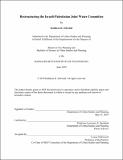Restructuring the Israeli-Palestinian Joint Water Committee
Author(s)
Schwind, Kathleen K.
Download1140073143-MIT.pdf (12.23Mb)
Alternative title
Restructuring the Israeli-Palestinian JWC
Other Contributors
Massachusetts Institute of Technology. Department of Urban Studies and Planning.
Advisor
Lawrence E. Susskind.
Terms of use
Metadata
Show full item recordAbstract
How can the Israeli-Palestinian Joint Water Committee (JWC) be restructured as a problem-solving entity and how can this newly structured JWC contribute to mutual water security in the region? While the Israel-Palestine conflict remains unresolved, thousands in the region lack a reliable water source. Climate change continues to exacerbate water scarcity, while new technologies like desalination are changing the nature of the relationship between the two parties. Overall, though, there is a deeply rooted sense of distrust between the parties, and political tensions have stalled fruitful water collaboration in recent years. Oslo II called for the creation of the Israel-Palestine JWC in 1995, but since then joint-efforts have had limited success. For over half a decade there were no formal meetings due to political tensions. Through a review of the literature, a case comparison with the Israel-Jordan water agreement and subsequent JWC, and interviews with leading Israeli, Palestinian, Jordanian, and American water diplomacy experts, hydrologists, professors and past JWC members, I draw five prescriptive conclusions regarding the best ways to restructure the Israeli-Palestinian JWC. First, the JWC needs to adopt a long-term perspective and allow itself to evolve over time, rather than expecting to create a committee with an unchanging structure. In doing so, it should establish a mutually agreed upon conflict resolution and joint-fact finding mechanism, to ensure equal power dynamics between the parties. Second, technical decision-making should be given a larger role to the JWC. Third, the JWC should shift from a model based on confidentiality to one based on transparency, becoming more transparent as outsiders (the public, respective governments, international community) start building more faith in the JWC's ability to make positive and tangible change. Fourth, the JWC should seek international support to help financially implement joint-projects outlined by the technical subcommittees under the JWC. Lastly, the JWC should work on reframing water in terms of "water security" not "national security." A restructured Israeli-Palestinian JWC could help facilitate collaboration towards actually discussing and carrying out joint-water research and projects, and rekindle trust between the water negotiators and experts on both sides. It cannot be said for certain that water will be an immediate stepping stone towards overall peace in the region. But water is a worthy first step: Israelis and Palestinians should work together to mutually achieve water security, building some amount of trust along the way, and demonstrate that the two sides can work together to provide their people with the water they need without compromising each sides most important interests.
Description
This electronic version was submitted by the student author. The certified thesis is available in the Institute Archives and Special Collections. Thesis: M.C.P. and S.B., Massachusetts Institute of Technology, Department of Urban Studies and Planning, 2019 Cataloged from student-submitted PDF version of thesis. Includes bibliographical references (pages 156-164).
Date issued
2019Department
Massachusetts Institute of Technology. Department of Urban Studies and PlanningPublisher
Massachusetts Institute of Technology
Keywords
Urban Studies and Planning.